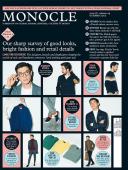
Issue 87
Our sharp survey of good looks, bright fashion and retail details. Look the business! The designers, brands and shopkeepers shaping the worlds of style and handsome commerce (and making good gear too)
In This Issue
Oops! No content was found.
Looks like we no longer have content for the page you're on. Perhaps try a search?
Return Home

